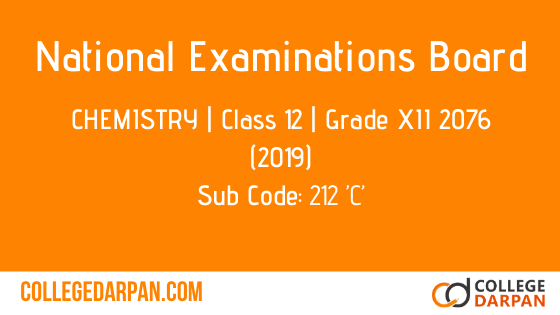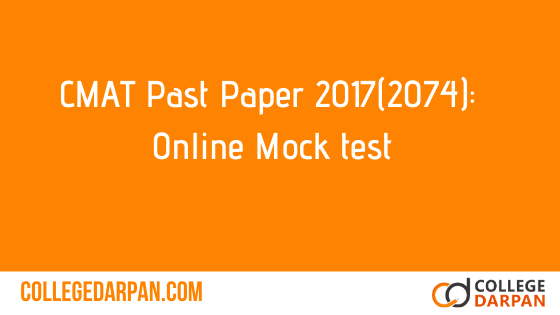
Subject Code: 212 ’C’
NEB- Grade XII
2076 (2019)
Chemistry
Candidates are required to give their answers in their own words as far as practicable. The figures in the margin indicate full marks.
Time – 3 hrs
Full Marks – 100
Pass marks: 27 (only for partial students)
Group ‘A’
Attempt any fifteen questions. [15×2=30]
1. C in C2H2 gets SP hybridization, why? [2]
2. Distinguish between titration error and normality factor. [2]
3. Write the conjugate acid and base of NH3. [1+1=2]
4. How many coulombs are required to produce [1+1=2]
i) 80 gm of calcium from molten CaCl2?
ii) 50 gm of Aluminium from molten Al2O3?
5. State the first law of thermodynamics. [2]
6. Calculate entropy change(△S) and free energy change(△G) for the conversion of ice into water at equilibrium when enthalpy change(△S) is 9KJ/mol. [2]
7. You are given rate law equation Rate = K[A]2[B]. By how many times will the rate increase or decrease for the reaction if
i) Concentration of Ⓐ is doubled while that of Ⓑ remain constant.
ii) Concentration of Ⓐ is kept constant that of Ⓑ is doubled. [1=1=2]
8. How is sodium benzoate converted into acetophenone? [2]
9. Explain, why chlorobenzene less reactive than benzene in electrophilic substitution reaction? [2]
10. What product would you obtain when phenol is treated with [1+1=2]
i) Benzene diazonium chloride?
ii) Phthalic anhydride?
11. Identify the major product Ⓐ; and Ⓑ giving their IUPAC names in the given reaction sequence. [1+1=2]
Methoxy Methane (excess HI / △) -> Ⓐ (Sodium phenoxide / △) -> Ⓑ
12. An organic compound C3H6O does not give silver mirror with tollen’s reagent but gives yellow precipitation with NaOH and I2. Identify the compound and write the reactions involved. [2]
13. Why is Nitro group called an ambident group? [2]
14. What happens when aniline is
i) treated with benzene diazonium chloride.
ii) heated with chloroform in presence of alc. KOH. [1+1=2]
15. Write down the functional isomer of methyl methanoate, what product would you expect when the isomer is heated with P2O5? [1+1=2]
16. What are lipids? Name the products formed when simple lipids undergo hydrolysis. [1+1=2]
17. What is meant by i) invert sugar and ii) non-reducing sugar. [1+1=2]
18. Mention an important function of each of the following:
i) DDT
ii) Nitrogen Fertilizer
iii) tranquilizers
iv) board spectrum antibiotics. [0.5×4=2]
19. Name the monomers of backelite and state the polymerisation process of it. [1+1=2]
20. How is granulated zinc obtained? Write its an important application. [1+1=2]
21. Why is silver nitrate solution used for staining fingers of voters during election? [2]
22. What is meant by i) quenching of steel. ii) annealing of steel. [1+1=2]
Group ‘B’
Attempt any Five questions: [5×5=25]
23. It is better to express concentration molality rather than molarity, Why? X gm of a metal (equivalent weight=12) was completely dissolved in 100 cc of N/2 HCL solution. The volume was then made upto 500cc. It is found that 25cc of the diluted acid solution required 17.5cc of N/10 NaOH for complete neutralization. Find the value of X. [1+4=5]
24. Mention the important applications of standard hydrogen electrode. The standard electrode potential for FE+3 / FE+2 and I2/I –are +0.77V and +0.54V respectively.
i) Draw the standard cell notation.
ii) Identify the anode and cathode as the current drawn from it.
iii) Write the cell reaction taking place at the electrodes.
iv) Calculate standard cell potential. [1+1+1+1=4]
25. State enthalpy of combustion. If heat of formation of CO2, H2O and C6H12O6 are -395 KJ mol-1 and 1169 KJ mol-1 respectively. Calculate the heat of combustion of glucose. [1+4=5]
26. Write the chemistry of corrosive sublime. [5]
27. Starting from Grignard’s reagent, how would you prepare
i) propan-ol
ii) propan-2-ol. Mention the chemical test to distinguish them. Write down the structural formula of neo-pentyl alcohol and its IUPAC name. [1+1+2+1=5]
28. How is trichloromethane prepared in the laboratory? Why is it discouraged to use chloroform as an anesthesia? [5]
29. An aliphatic compound ‘A ‘ reacts with SOCl2 to give ‘B’. The compound ‘B’ is heated with ammonia to produce ‘C’. The Compound ‘C’ is further heated with Br2 / KOH to yield ‘D’. The Compound ‘D’ gives ‘E’ when treated with NaNO2/HCl at low temperature. The Compound ‘E’ is primary alcohol which gives positive idoform test. Identify A, B, C, D and E Write reactions involved. [4+1=5]
Group ‘C’
Attempt any Two questions: [2×10=20]
30. Describe laboratory method of preparation of pure and dry nitrobenzene. Identify the major products A, B, C and D in the following reaction sequence
A ((PCL3)/ △)-> B ((H2)/(pd/BaSO4)) -> C ((alc.KSN) -> D
The compound C can be obtained by oxidation of toluene in presence of CeO2/H+ [6+1+1+1+1=10]
31. (a) How is propanone prepared from
i) 2, 2-dichloro propane
ii) isopropyl alcohol
iii) propyne.
Give the suitable chemical reaction for the conversation of ethanoicacid into
i) methane
ii) methyl ethanoate. [3+2=5]
b) Write down a structural formula of primary, secondary and tertiary amines of each from C3H9N. How would you apply Hoffmanns’ methods to separate them from their mixture? [3+2=5]
32. State Ostwald’s dilution law. What is the limitation of this law? Define the terms
i) ionic product of water
ii) common ion effect
iii) degree of ionisation
iv) PH value. What will be the resultant PH when 200ml of aqueous solution of HCL ( PH=2) is mixed with 300ml of an aqueous solution of NaOH ( PH=12)? [1+1+1+1+1+1+4=10]
33. Write short notes of any two . [2×5=10]
i) Chemistry of rusting theory of iron.
ii) Extraction of blister copper from copper pyrites.
iii) Lewis concept of acid and base.
iv) Laboratory preparation of ethoxyethane.
Download Questions only PDF: NEB- Grade XII 2076 (2019) Chemistry(212 ’C’): NEB- Grade XII 2076 (2019) Chemistry(212 ’C’) Question only.
Download Full Answers Below:



